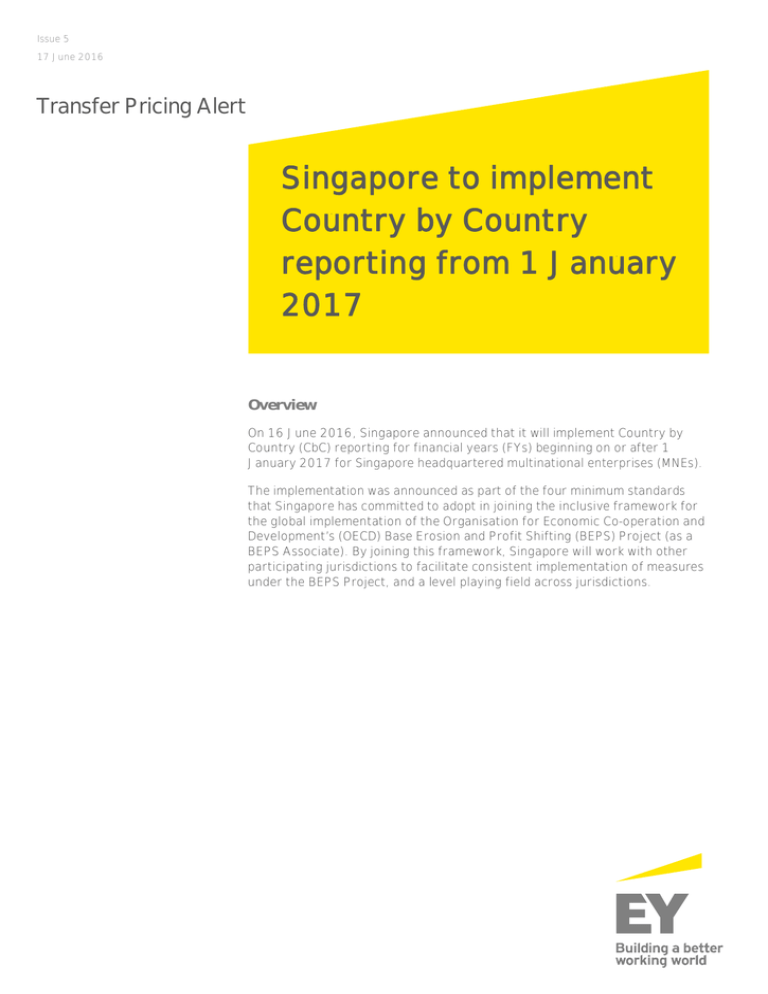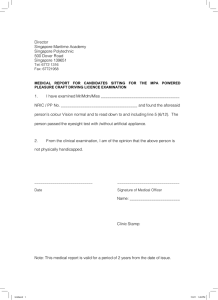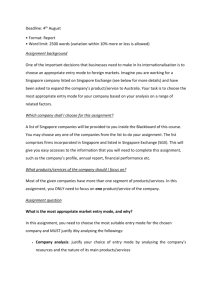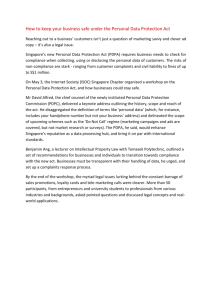
Issue 5
17 June 2016
Transfer Pricing Alert
Singapore to implement
Country by Country
reporting from 1 January
2017
Overview
On 16 June 2016, Singapore announced that it will implement Country by
Country (CbC) reporting for financial years (FYs) beginning on or after 1
January 2017 for Singapore headquartered multinational enterprises (MNEs).
The implementation was announced as part of the four minimum standards
that Singapore has committed to adopt in joining the inclusive framework for
the global implementation of the Organisation for Economic Co-operation and
Development’s (OECD) Base Erosion and Profit Shifting (BEPS) Project (as a
BEPS Associate). By joining this framework, Singapore will work with other
participating jurisdictions to facilitate consistent implementation of measures
under the BEPS Project, and a level playing field across jurisdictions.
Singapore to implement Country by Country (CbC) reporting from 1 January 2017
2
Background
Singapore as a BEPS Associate
On 5 October 2015, the OECD released final
reports on all 15 focus areas in its Action Plan on
BEPS. This included the final report on Action 13 –
Guidance on transfer pricing documentation and
CbC reporting. Subsequently, many countries have
released their positions on Action 13 through draft
or enacted legislation.
Singapore has been a participant at the OECD’s
Committee of Fiscal Affairs (CFA) since 2013 and
has been active in providing input to the design of
BEPS Project. Singapore has also worked with the
OECD and G20 to facilitate that the new framework
for implementing BEPS Project is inclusive.
The final report on Action 13, sets out a threetiered standardised approach to transfer pricing
documentation. This standardised approach
consists of:
► A “master file” that provides tax
administrations with high level information
regarding a MNE’s global business operations
and transfer pricing policies;
► A specific “local file” that provides a local tax
administration with information regarding
material related party transactions, the
amounts involved, and the company’s analysis
of the transfer pricing determinations they have
made with regard to those transactions; and
► A CbC reporting template that requires large
MNEs to report the amount of revenue (related
and unrelated party), profits, income tax paid
and taxes accrued, employees, stated capital
and retained earnings, and tangible assets
annually for each tax jurisdiction in which they
do business. In addition, MNEs are required to
identify each entity within the group doing
business in a particular tax jurisdiction and to
provide an indication of the business activities
each entity conducts.
On 6 January 2015, the IRAS released revised
transfer pricing guidelines (subsequently further
revised in January 2016). The revisions included a
requirement to prepare contemporaneous transfer
pricing documentation, including group level
information and entity level information broadly in
line with the master file and local file concept of
the OECD.
The recent announcement sets out the Singapore
government’s intention to mandate Singapore
headquartered MNEs to also submit a CbC report.
On 16 June 2016, Singapore’s Ministry of Finance
announced that Singapore will join the inclusive
framework for the global implementation of the
BEPS Project. As a BEPS Associate, Singapore is
committed to implementing the four minimum
standards under the BEPS Project, namely:
► Action 5: Countering harmful tax practices;
► Action 6: Preventing treaty abuse;
► Action 13: Transfer pricing documentation; and
► Action 14: Enhancing dispute resolution.
Singapore’s position on Action 13
As a BEPS Associate, Singapore has committed to
implementing CbC reporting for FYs beginning on
or after 1 January 2017 for MNEs whose ultimate
parent entities are in Singapore and whose group
turnover exceed S$1,125 million (approximately
equivalent to EUR750 million). These large
enterprises are required to file the CbC reports with
the Inland Revenue Authority of Singapore (IRAS)
within 12 months from the last day of their FY.
The IRAS will exchange CbC reports with
jurisdictions that Singapore has entered into
bilateral agreements with for automatic exchange
of CbC reporting information, provided the
following conditions are met:
►
These jurisdictions should have a strong rule of
law and can facilitate confidentiality of the
information exchanged and prevent its
unauthorised use.
►
There must be reciprocity in terms of the
information exchanged.
Singapore to implement Country by Country (CbC) reporting from 1 January 2017
The IRAS will consult Singapore-headquartered
MNEs further on the implementation details of CbC
reporting, and release these details by September
2016. Details may include some or all of the
following clarifications:
► Master file and local file: Singapore’s transfer
pricing guidelines already include a requirement
to prepare contemporaneous transfer pricing
documentation including group level
information and entity level information.
It remains to be seen whether the Singapore
government will further update the Singapore
transfer pricing guidelines to require Singapore
headquartered MNEs to include the group level
information in a separate master file document
that can be shared under exchange of
information.
► Manner of filing information: On 22 March
2016, the OECD released details of the
standardised electronic format for the
exchange of CbC reports between jurisdictions
called CbC XML Schema. We expect the IRAS to
implement this as a preferred or mandated
format for the submission of data, facilitating
analytical review by tax authorities.
► Inclusion of a secondary reporting mechanism:
The final BEPS Action 13 report introduced the
concept of secondary reporting mechanism
with respect to CbC reporting. The secondary
mechanism is to be implemented in case a
country fails to receive information regarding a
particular MNE through exchange of
information from an overseas country. The
current announcement from the Singapore
Ministry of Finance (MOF) does indicate that
CbC reporting would be required for Singaporeheadquartered MNEs. This may suggest that
there will be no secondary mechanism requiring
MNEs headquartered outside Singapore to file
CbC reports separately in Singapore. However
we await further details on this matter – if a
secondary mechanism is implemented, then the
scope of the CbC reporting requirement in
Singapore would be significantly expanded.
► Surrogate filing location: The final BEPS Action
13 report recognises and provides for
3
“surrogate filing location”, under which one
entity of the MNE can designate a group
company to act as a “surrogate parent” entity
and file on behalf of the entire group. We do
not expect that it will be possible for an MNE
headquartered outside Singapore to nominate
Singapore as a surrogate filing location, but
the current announcement does not provide
clarification either way.
► Implementation date: CbC reporting will be
implemented in Singapore from FYs beginning
on or after 1 January 2017. This is 12 months
later than the original intention of the OECD
and 12 months later than implementation in
other countries. As noted above, certain
countries have secondary filing mechanisms in
place which means that Singapore MNEs may
be required to prepare and file CbC reports in
these overseas countries for FY 2016,
regardless of the rules coming into force in
Singapore from FYs beginning on or after 1
January 2017 onwards. We recommend that
MNEs monitor requirements not just in
Singapore but also in overseas countries.
Other comments
In adopting the four minimum standards, the
taxpayers would need to wait and see whether
Singapore will legislate the changes to be
introduced or only publish guidelines to bring the
change in effect. An alternative could be that
Singapore might only bring in changes to introduce
CbC reporting in the current guidelines, based on
the undertaking that the other minimum standards
are already taken care of in the current tax
legislation.
Also, we believe Singapore might introduce
changes in the master file and local file content to
be in line with the CbC reporting regulations, in the
detailed guidelines expected in September 2016.
Conclusion
Whilst the preparation of the CbC reports may be
onerous, Singapore’s commitment to implement
CbC reporting for FY beginning on or after 1
January 2017 for Singapore headquartered MNEs
reduces the administrative burden for Singapore
headquartered taxpayers since CbC reports should
Singapore to implement Country by Country (CbC) reporting from 1 January 2017
not need to be prepared under the secondary
mechanism for reporting in other jurisdictions. CbC
reports would need to be prepared and filed with
the IRAS and further exchange would be through
automatic exchange of information. Further,
Singapore’s stress on confidentiality of information
shared under CbC report is also welcomed by the
taxpayer community; thus safeguarding the
information shared.
Taxpayers will have to wait for the release of the
guidelines by IRAS on implementation details of
CbC reporting post consultation with Singapore
headquartered companies. Details will be released
by September 2016.
The September 2016 guidelines will be important
not only to determine the compliance requirements
of Singapore-headquartered MNEs, but also how
MOF will determine and identify the jurisdictions
that satisfy the conditions stated in its press
release, in particular jurisdictions viewed as having
a strong rule of law and can ensure confidentiality
of the information exchanged.
As one of the first movers to join this inclusive
framework, this reiterates Singapore’s
commitment to key principles underlying the BEPS
project, which is important in retaining status of
Singapore as a robust business location and a
jurisdiction which does not condone treaty abuse.
With these BEPS changes (particularly around
transparency), there will inevitably be additional
burden placed on taxpayers around reporting and
indeed reviewing their operating models to
facilitate compliance with the new international
standard. However this should be seen as a small
price to pay. In a world now characterised by
greater transparency, Singapore adopting
internationally-accepted standards of tax policy, in
addition to an attractive tax regime, should result
in less scrutiny by other tax authorities when
Singapore appears on the other side of the
transaction.
4
Next Steps
Singapore taxpayers should identify if they may
have to file CbC reporting based on the threshold
announced by the Singapore MOF. They should
also conduct a CbC readiness assessment by
reviewing existing data, systems’ capabilities and
internal resources available to gather data and
information across group subsidiaries for CbC
reporting.
In addition, taxpayers should analyse CbC
reporting requirements and plan to implement
required changes to documentation, policies, and
systems in advance of the filing deadline by taking
into consideration that CbC reporting is an annual
exercise.
Taxpayers should also confirm that the information
disclosed in the CbC reporting is consistent with
the overall transfer pricing position presented in
the transfer pricing documentation.
Singapore to implement Country by Country (CbC) reporting from 1 January 2017
Contact us
Luis Coronado
Partner, Singapore and EY Asean Leader, International Tax
Services
Ernst & Young Solutions LLP
Tel: +65 6309 8826
Email: luis.coronado@sg.ey.com
Henry Syrett
Partner, Transfer Pricing Services
Ernst & Young Solutions LLP
Tel: +65 6309 8157
Email: henry.syrett@sg.ey.com
Stephen Lam
Partner, Transfer Pricing Services
Ernst & Young Solutions LLP
Tel: +65 6309 8305
Email: stephen.lam@sg.ey.com
Stephen Bruce
Partner, Financial Services Tax
Ernst & Young Solutions LLP
Tel: +65 6309 8898
Email: stephen.bruce@sg.ey.com
Jonathan Belec
Director, Transfer Pricing Services
Ernst & Young Solutions LLP
Tel: +65 6309 6175
Email: jonathan.belec@sg.ey.com
Sharon Tan
Associate Director, Transfer Pricing Services
Ernst & Young Solutions LLP
Tel: +65 6309 6375
Email: sharon.tan@sg.ey.com
Jiyeon Chang
Associate Director, Transfer Pricing Services
Ernst & Young Solutions LLP
Tel: +65 6309 6400
Email: jiyeon.chang@sg.ey.com
EY | Assurance | Tax | Transactions | Advisory
About EY
EY is a global leader in assurance, tax, transaction and
advisory services. The insights and quality services we
deliver help build trust and confidence in the capital
markets and in economies the world over. We develop
outstanding leaders who team to deliver on our
promises to all of our stakeholders. In so doing, we play
a critical role in building a better working world for our
people, for our clients and for our communities.
EY refers to the global organisation, and may refer to one or
more, of the member firms of Ernst & Young Global Limited,
each of which is a separate legal entity.
Ernst & Young Global Limited, a UK company limited
by guarantee, does not provide services to clients.
For more information about our organisation,
please visit ey.com.
© 2016 Ernst & Young Solutions LLP.
All Rights Reserved.
APAC no. 12000810
Ernst & Young Solutions LLP (UEN T08LL0784H) is a limited liability partnership
registered in Singapore under the Limited Liability Partnerships Act (Chapter
163A).
This material has been prepared for general informational purposes
only and is not intended to be relied upon as accounting, tax, or other
professional advice. Please refer to your advisors for specific advice.
ey.com
5




